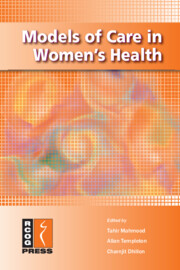Book contents
- Frontmatter
- Contents
- About the authors
- Abbreviations
- Preface
- CHAPTER 1 Setting the scene
- CHAPTER 2 Early pregnancy loss, including ectopic pregnancy and recurrent miscarriage
- CHAPTER 3 Infertility
- CHAPTER 4 Acute gynaecology
- CHAPTER 5 Sexual and reproductive health services
- CHAPTER 6 Termination of pregnancy
- CHAPTER 7 Heavy menstrual bleeding
- CHAPTER 8 Post-reproductive gynaecology
- CHAPTER 9 Urogynaecology
- CHAPTER 10 Vulval disease
- CHAPTER 11 Gynaecological oncology
- CHAPTER 12 Colposcopy services
- CHAPTER 13 Laparoscopic surgery
- CHAPTER 14 Gynaecological risk management
- CHAPTER 15 The role of the clinical director
- CHAPTER 16 Recommendations
- Index
CHAPTER 10 - Vulval disease
Published online by Cambridge University Press: 05 July 2014
- Frontmatter
- Contents
- About the authors
- Abbreviations
- Preface
- CHAPTER 1 Setting the scene
- CHAPTER 2 Early pregnancy loss, including ectopic pregnancy and recurrent miscarriage
- CHAPTER 3 Infertility
- CHAPTER 4 Acute gynaecology
- CHAPTER 5 Sexual and reproductive health services
- CHAPTER 6 Termination of pregnancy
- CHAPTER 7 Heavy menstrual bleeding
- CHAPTER 8 Post-reproductive gynaecology
- CHAPTER 9 Urogynaecology
- CHAPTER 10 Vulval disease
- CHAPTER 11 Gynaecological oncology
- CHAPTER 12 Colposcopy services
- CHAPTER 13 Laparoscopic surgery
- CHAPTER 14 Gynaecological risk management
- CHAPTER 15 The role of the clinical director
- CHAPTER 16 Recommendations
- Index
Summary
Key points
✓ Vulval disorders should be managed in the context of a specialist vulva clinic.
✓ A lead clinician with an interest and expertise in vulval disease should be responsible for running the clinic.
✓ Clinics should be easily accessible and be convenient for patients. Community-based clinics should be considered.
✓ Patient information should be readily available, both in the clinic and as a web-based resource.
✓ Clinics should be well equipped, ideally with a colposcope and couch and the facilities for biopsy.
✓ Clinics should be adequately staffed by appropriately trained individuals including a specialist gynaecology nurse.
✓ Management should be multidisciplinary with genitourinary consultants, dermatologists and chronic pain specialists. Access to psychosexual support should be available.
✓ Provision should be made to allow trainees access to the clinic.
✓ The lead clinician should be a member of a national or international vulval society and should attend educational meetings.
✓ Data from the clinic should be captured accurately and used in an audit programme which is presented to the multidisciplinary team at least annually.
Introduction
In the past, vulval conditions may have been seen by specialists lacking the necessary experience and knowledge to adequately assess, diagnose and manage such problems.
Often they would be seen in the context of a busy gynaecology, genitourinary or dermatology clinic lacking the resources, staffing and support structures necessary to ensure optimal care. As a result, some women may have found themselves misdiagnosed and given inappropriate or ineffective treatments. This suboptimal approach to care, although well intentioned, may have had consequences which were potentially harmful for the women concerned.
Although dedicated vulval clinics have existed in some units for many years, it is only relatively recently that the need for a structured, multidisciplinary approach to these problems has been recognised. The formation of a service to appropriately deal with vulval problems inevitably requires time, enthusiasm and resources. In a health service where competition for resources is intense, this presents its own challenges. With the advent of ‘Choose and Book’, the national electronic referral and booking service, patients now have a choice of where their care will be delivered. For those wishing to deliver vulval services, it is therefore vital that care of the highest quality is instituted and maintained.
Keywords
- Type
- Chapter
- Information
- Models of Care in Women's Health , pp. 99 - 105Publisher: Cambridge University PressPrint publication year: 2009



